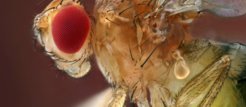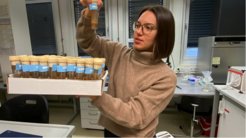Fruit flies in research: An SWR Wissen interview with Luisa Pallares
How Drosophila is revolutionising our understanding of genetics and disease
In an SWR Wissen interview with Luisa Pallares from the riedrich Miescher Laboratory of the Max Planck Society in Tübingen, we learn why fruit flies are indispensable as model organisms in research. The small insects play a crucial role in genetics, evolution and research into diseases such as diabetes and Alzheimer's. Luisa Pallares shares her passion for these fascinating creatures and explains the latest developments in research, including the innovative TF-HighEvo method.

Fruit flies, also known as Drosophila, are not only pesky guests in our kitchens, but also true heroes in scientific research. These little insects have become indispensable model organisms, enabling scientists to study complex biological processes. In an insightful interview with Luisa Pallares, a leading researcher at the Max Planck Institute for Biology in Tübingen, we learn more about the importance of Drosophila in modern research.

Luisa Pallares explains to SWR Wissen that fruit flies are a valuable research resource because they reproduce quickly and are genetically similar to humans. “We share 60 percent of our genes with them,” she says. “What's more, 95 percent of the genes that cause disease in humans can also be found in flies.” These characteristics make Drosophila an ideal model organism for studying genetics, evolution and disease.
One particularly exciting topic that Luisa Pallares addresses is the new TF-HighEvo method, which was developed in collaboration with researchers in Heidelberg. This innovative technique significantly accelerates the natural evolution of fruit flies. “If an evolution experiment used to take ten years, it can now be done in six months,” she explains enthusiastically. This method opens up new possibilities for research and could help to gain important insights into genetic changes and their effects on health.
Another fascinating aspect of Drosophila research is the fly brain. Despite their small size, flies are able to perform complex tasks, such as flying, finding mating partners and recognising predators. Luisa Pallares emphasises: “The fly is a very small animal and very far removed from humans. But, when you look at it, flies can do a lot of complicated things.”
In conclusion, fruit flies are much more than just a nuisance in the kitchen. They are key players in research that helps us unlock the secrets of genetics and human health. Luisa Pallares’ passion for these little insects is infectious and demonstrates the importance of understanding the science behind the seemingly simple things.

